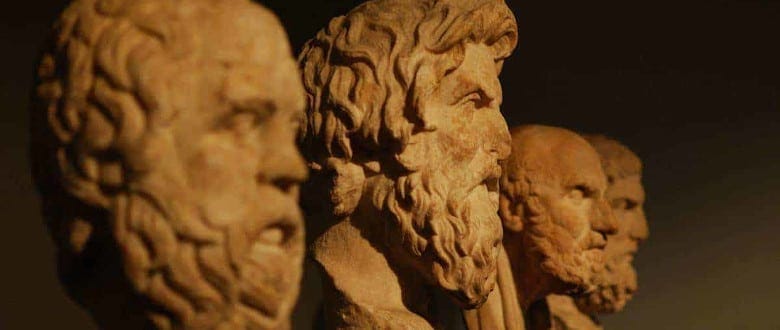The Forgotten Fragility of Democracy
The observations of the ancients echo loudly in modern politics.
Antony Jackson is a recent graduate from Utah Valley University, where he received a degree in Public Law and Political Philosophy. For the last several years, he has been a team lead and all-around guru for the Quill Project at UVU’s Center for Constitutional Studies. He has plans underway to begin his doctoral studies this coming fall.
In the United States, the people are sovereign. Left or right, most Americans consider democracy to be one of the great things about our political system. However, we need to temper this reverence for democracy. Democracies throughout history have been weak and corrupt. They have failed more than they have succeeded, and Americans often take it for granted that ours has survived for so long. We should recognize the fragility of our system, learn how to protect democracy with proper institutions and traditions, and work towards implementing what history can teach us as best as we can.
I should note before I go on that I think the United States is best defined as a constitutional federal republic with democratic ideals, not a traditional democracy. I do think, however, that the democratic nature of our republic, even with the constitutional, federal, and republican protections in place, means we are a “democracy.”
To begin with, I want to take a look at several recent struggles for democracy around the world. In particular, I wanted to look at the various struggles that inspired me to write this piece, including the riots and protests in Hong Kong, January 6th here in the U.S., and the 2021 Samoan constitutional crisis.
Before the pandemic hit the world hard, the news I followed most intently were the protests and riots in Hong Kong. Thousands of protestors took to the streets in what would turn into violent clashes with the mainland Chinese forces. These protestors were raised in a system influenced so much by the British parliamentary system that judges still wear wigs. As such, they cherished the freedoms, liberty, and democratic ideals of that system, and many have demonstrated their willingness to die before submitting to the authoritarian Chinese regime.
Closer to home, January 6th represents another challenge to democracy. This example is slightly more complicated as it is not one group fighting an obviously tyrannical oppressor. Instead, it was a misguided group of criminals who thought their own government was acting in an illegitimate fashion.
When people begin to lose faith in the legitimacy of political institutions, they begin to act out against the institutions. When this happened on January 6th, the frustrated rioters did what they thought was necessary given the circumstances, even if, as they did what they did, they undermined the very principles of democracy they believed they were standing for. Before I move on, I want to be sure to mention that in my explanation of this situation, I do not condone any part of it and condemn it completely as a criminal and vile attack on our political system and especially against democracy.
Leaving the United States once again, to the small island nation of Samoa, we see another challenge to a very young democracy. While the foundations of the problems this country has faced trace their roots back decades, the past two years have uncovered concerning realities. The (now former) Prime Minister Tuila’epa Malielegaoi tried to raise a court that held jurisdiction over tradition and culture—a court unique to the Samoan political system—to be superior to the Supreme Court, something that legal experts in Samoa, New Zealand, and Australia condemned. His Deputy Prime Minister and other members of his party split, opposing this constitutional breach, and won enough seats to form a new government. Tuila’epa refused to step down and locked the doors to parliament for months until overwhelming judicial and popular pressure, and loss of much of his support in parliament, turned the tide against him.
These are just a few examples I chose because of my familiarity with the situations. There are many more examples I could use both geographically and historically. My point is we can see the weakness in these systems today. Is this enough for concern? I think so, but let’s talk to some of the ancients and get their observations and opinions.
I don’t like oversimplifying the political thinkers of the past, but for the sake of this piece (and because of the depth of the topic at hand) I am going to generalize Plato, Aristotle, and Cicero’s thoughts on democracy as a form of government.
Plato was likely quite bitter towards democracies because a democratic regime put to death his mentor, Socrates. Several Athenian citizens had accused Socrates of corrupting the youth and impiety based on weak charges, and he ended up receiving a sentence of death at the hands of a democratic jury. In his Apology, Socrates hoped that the jury would listen to reason, while his opponent tried and succeeded in riling up their emotions just enough to get the defendant condemned.
Besides the fact that Plato lost his master to a democratic jury, whose decision was emotional instead of legal or reasonable, his philosophical writings lay out why democracy, and the democratic spirit, is bad. First, Plato thought that all regimes besides his idealized republic were corrupt and the result of a regime decaying from one system to another. As part of this theory, Plato thought that democratic regimes naturally deteriorate into tyrannies.
It is important to note that Plato’s idea of a tyranny is a single individual with all power. He was not imagining a tyrannical majority like Madison would imagine, but instead that the large groups of democratic people would feel they lack order and seek a strong person to lead them. This individual would appear to be for the people as he took their power away.
Not to skip Aristotle, but this is exactly what the Romans would deal with as Julius Caesar became Dictator Perpetuo. Cicero and others saw the popularity and ambition of Caesar and tried to fight against his growing power. Caesar was such a popular figure that when the Roman Senate killed him, the people were furious that they killed their dictator.¹ Cicero was one of many who stood against Caesar for the rights of the people. Though he stood for their rights, he thought that the people did not usually make proper decisions even when it came to choosing their leader.
Aristotle also thought democracy was a corrupt form of government. He thought that democracy was a corrupt government where the majority rules over the whole, or that the poor rule over and oppress the rich in a form of mob rule. Opposed to democracy was Aristotle’s idea of polity, where the people ruled themselves with a mind to everyone else. In other words, the difference between democracy and polity, according to Aristotle, was a willingness of the people to respect the constitutional law that governed them.²
It also appears that what Aristotle calls polity is closer to what we call democracy, and what he called democracy is what we might consider mob rule or tyranny of the majority. We can conclude from Aristotle’s observations that the line dividing democracy from a tyrannical majority is only an idea, an idea that law is supreme to the unbridled will of the people. This line is weak and doomed to fail.
Democracy and democratic principles are inherently weak. That does not mean they are bad. Instead, it means that we cannot take them for granted and must work to preserve them. I hope by showing some examples and by citing the wisdom of the ancients, I have been able to impress the importance of this issue.
The first step to working to preserve our institutions is to know what the problem is. I hope that my words will encourage anyone reading this to read more, and learn about the weaknesses of democracy, what has been done in the past to fix these issues, and how we can do more. Knowledge is the best tool right now.





Very interesting. I would have appreciated more elaboration on each of the philosophers, as well as more elaboration on the conclusion. How exactly do we take these philosophers’ arguments into account when shoring up out fragile “democracy”/constitutional republic after 1/6? I would suggest that more emphasis on Aristotle’s understanding of the rule of law would help. But what does that look like in practice in 2022?
Plato was right to hold it against Athenian democracy that they executed Socrates. Executing an innocent man is a deserved black mark.
Rome’s Republic was complicated and Cicero’s relationship with the people and with the rule of law was too. Pro Milone is an interesting example of rhetoric, but evidence Cicero wasn’t above the political fray. However, he was against Caesar and Caesar Augustus and was proscribed and put to death when the Republic truly ended, meaning that he stood against imperialism when it counted.